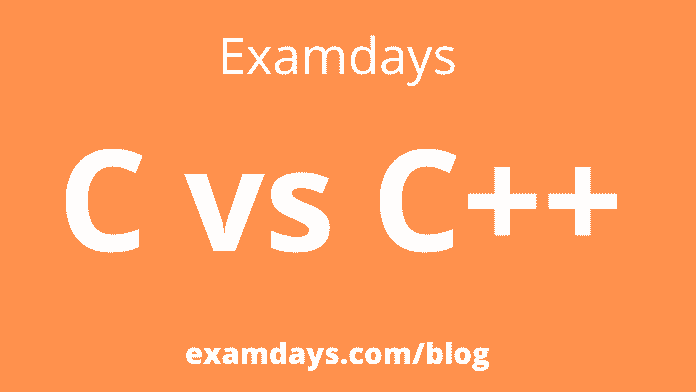C vs C++: Candidates who are looking for the C vs and C++ difference for the programming languages, Where C++ is more powerful than C, and other important details. These details are important for job interviews and examination purposes. Also, for the competitive exams.
What is C language?
C is a programming language that follows structured, procedural programming. C programming language is widely used for operating systems and applications and has wide adoption in academia. Many versions of UNIX-based operating systems are written as standard as part of C. C. Portable Operating System Interface (POSIX).
Dennis Ritchie developed the C language for writing system applications that directly interact with hardware devices such as drivers, kernels, etc. C programming was the base for other programming languages. Hence it is called the mother language.
C language can be defined in the following ways:
- Mother language
- System programming language
- Procedure-oriented programming language
- Structured programming language
- Mid-level programming language
What is C++ language?
C++ is regarded as a middle-level language because it has a combination of high-level and low-level language features.
C++ was developed by Bjarne Stroustrup at Bell Labs in Murray Hill, New Jersey, in 1979 as an improvement on the C language and was originally named C with Classes but was later renamed C++ in 1983.
C++ runs on various platforms such as Windows, Mac OS, and various versions of UNIX.
C++ is a superset of C, and virtually any legal C program is a legal C++ program.
C++ is most famous for building extensive software infrastructure and applications that work with limited resources. Because C++ can directly manipulate the hardware (or machine) it runs on. Also, programmers can fine-tune their code to run efficiently in any environment, even if there is limited hardware space or power available to power the application.
Differences between C and C++ programming languages
| C | C++ |
| C is a programming language that follows structured, procedural programming. | C++ is a High-level programming language. |
| C support only procedural programming | C++ supports procedural, object-oriented, and generic programming |
| C doesn’t support function and operator overloading. | C++ supports function and operator overloading. |
| C is not used widely. | C++ is widely use. |
| C doesn’t have Namespaces and virtual functions. | C++ have Namespaces and virtual function. |
| C is not capable of generic programming. | C++ is capable of generic programming. |
| C isn’t a subset of C++ | C++ is the superset of C. |
| Data is less secure in C because no access modifiers to limit user access. | Data is more secure in C++ because offers access modifiers to limit user access. |
| C does not support object oriented programming. | C++ supports object oriented programming. |
C language example: Sum of two numbers
#include <stdio.h>
int main() {
int number1, number2, sum;
printf(“Enter two integers: “);
scanf(“%d %d”, &number1, &number2);
// calculating sum
sum = number1 + number2;
printf(“%d + %d = %d”, number1, number2, sum);
return 0;
}
C++ language example: Sum of two numbers
#include <iostream>
using namespace std;
int main() {
int first_number, second_number, sum;
cout << “Enter two integers: “;
cin >> first_number >> second_number;
// sum of two numbers
sum = first_number + second_number;
// printing the sum of two numbers
cout << first_number << ” + ” << second_number << ” = ” << sum;
return 0;
}
Conclusion:
- C is a procedural language. It uses the top-down approach in execution. It makes use of basic functions.
- C++ is object-oriented language. It makes use of class and objects. Uses a bottom-up approach for execution. Next level to C.
Examdays Article Agenda

